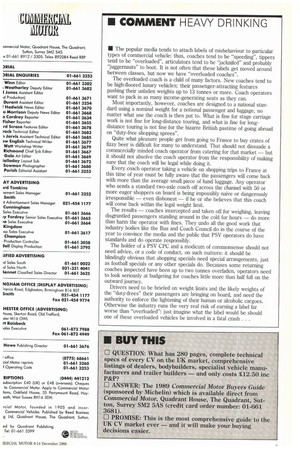• The popular media tends to attach labels of misbehaviour
Page 3

If you've noticed an error in this article please click here to report it so we can fix it.
to particular types of commercial vehicle: thus, coaches tend to be "speeding", tippers tend to be "overloaded", articulators tend to be "jacknifed" and probably "juggernauts" to boot. It is not often that these labels get moved around between classes, but now we have "overloaded coaches".
The overloaded coach is a child of many factors. New coaches tend to be high-floored luxury vehicles; their passenger-attracting features pushing their unladen weights up to 13 tonnes or more. Coach operators want to pack in as many income-generating seats as they can.
Most importantly, however, coaches are designed to a national standard using a nominal weight for a notional passenger and luggage, no matter what use the coach is then put to. What is fine for stage carriage work is not fine for long-distance touring, and what is fine for longdistance touring is not fine for the bizarre British pastime of going abroad on "duty-free shopping sprees".
Quite what pleasure people get from going to France to buy crates of fizzy beer is difficult for many to understand. That should not dissuade a commercially minded coach operator from catering for that market — but it should not absolve the coach operator from the responsibility of making sure that the coach will be legal while doing it.
Every coach operator taking a vehicle on shopping trips to France at this time of year must be fully aware that the passengers will come back with more than the average small piece of hand luggage. Any operator who sends a standard two-axle coach off across the channel with 50 or more eager shoppers on board is being impossibly naive or dangerously irresponsible — even dishonest — if he or she believes that this coach will come back within the legal weight limit.
The results — coaches intercepted and taken off for weighing, leaving disgruntled passengers standing around in the cold for hours — do more than harm the operator with fines. They undo all the good work that industry bodies like the Bus and Coach Council do in the course of the year to convince the media and the public that PSV operators do have standards and do operate responsibly.
The holder of a PSV CPC and a modicum of commonsense should not need advice, or a code of conduct, on such matters: it should be blindingly obvious that shopping specials need special arrangements, just as football specials or any other specials do. Becauses some returning coaches inspected have been up to two tonnes overladen, operators need to look seriously at budgeting for coaches little more than half full on the outward journey.
Drivers need to be briefed on weight limits and the likely weights of the "duty-frees" their passengers are bringing on board, and need the authority to enforce the lightening of their human or alcoholic cargoes. Otherwise the industry runs the very real risk of earning a label far worse than "overloaded": just imagine what the label would be should one of these overloaded vehicles be involved in a fatal crash. . .


















































































